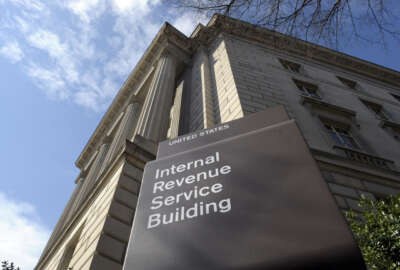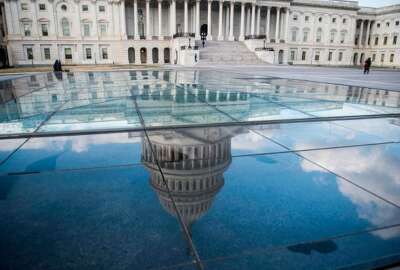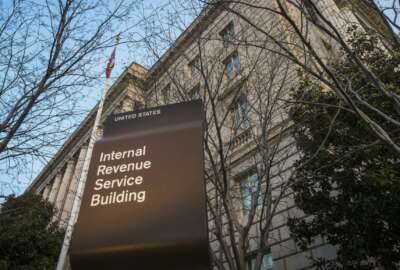

Sens. Mark Warner (D-Va.) and Tim Kaine (D-Va.) write to the Treasury Department seeking answers for how the IRS will handle tax refund season.
The IRS will get refunds out the door even in the face of a partial government shutdown.
Russ Vought, acting director of the Office of Management and Budget, made that promise on Monday in the face of rising concerns that the 2019 tax filing season and corresponding refunds would be delayed because of the lapse in funding.
Bloomberg reported Monday that Vought told reporters that the IRS would process tax filings and provide citizens with refunds, and “the administration is fixing what he called a problem faced by past administrations.”
A few hours later, the IRS announced it would kick-off filing season on Jan. 28.
“Although in 2011 the OMB directed the IRS not to pay refunds during a lapse, OMB has reviewed the relevant law at Treasury’s request and concluded that IRS may pay tax refunds during a lapse,” the tax agency states in a release Monday night. “The IRS will be recalling a significant portion of its workforce, currently furloughed as part of the government shutdown, to work. Additional details for the IRS filing season will be included in an updated FY2019 Lapsed Appropriations Contingency Plan to be released publicly in the coming days.”
The filing deadline to submit 2018 tax returns is Monday, April 15 for most taxpayers. Because of the Patriots’ Day holiday on April 15 in Maine and Massachusetts and the Emancipation Day holiday on April 16 in the District of Columbia, taxpayers who live in Maine or Massachusetts [or D.C.] have until April 17 to file their returns.
The news from Vought and the IRS comes as Democrat lawmakers are turning up the heat on agencies asking about citizen facing services such as those from the IRS and the Transportation Security Administration.
Sens. Mark Warner (D-Va.) and Tim Kaine (D-Va.) wrote a letter to Treasury Secretary Steven Mnuchin asking four questions about the impact of the partial government shutdown on the IRS and tax filing.
At the same time, Rep. Bennie Thompson (D-Miss.), chairman of the Homeland Security Committee, is pressing TSA Administrator David Pekoske on how many TSA officers are calling out sick and what contingency plans does the agency have in place to address possible mass call-outs.
Thompson’s letter comes after CNN reported hundreds of TSA officers from four major airports called out sick last week.
“Despite providing essential government services, TSA officers are among the lowest paid federal employees, with many living paycheck-to-paycheck. Officers may not be able to pay for rent, child care and other necessities if their paychecks do not arrive on time,” Thompson writes. “The fact that the overwhelming majority of officers have reported for duty without fail in the face of such challenges is a testament to their dedication to service. Still, it is only reasonable to expect call outs and resignations to increase the longer the shutdown lasts, since no employee can be expected to work indefinitely without pay.”
TSA issued a statement on Twitter in response to the report by CNN about officers calling in sick.
Statement on nationwide “sick out” as reported by CNN’s Rene Marsh and Gregory Wallace. #News pic.twitter.com/RK0wiFLRJt
— TSA (@TSA) January 4, 2019
Additionally, TSA said passengers were not experiencing additional delays given the limited number of employees who called out sick.
— TSA (@TSA) January 7, 2019
Thompson asked Pekoske for answers to six questions, including how TSA is ensuring adequate staffing levels at airports despite the call outs and whether the agency has made any changes to security policies, procedures or operations during the partial shutdown. He asked for answers from TSA as soon as possible.
Concerns over delays to the filing season and refunds from the IRS have been growing since the partial shutdown began on Dec. 22.
The IRS furloughed 88 percent of its workforce, while trying to update more than 450 forms and 140 IT systems before the start of the tax filing season in January, in order to comply with the Tax Cuts and Jobs Act.
“Given that most of the IRS employees are on furlough right now, it kind of stands to reason that they’re not getting the training they need, they’re not getting to do all of the preparatory work in order to be ready for a filing season,” said Tony Reardon, national president of the National Treasury Employees Union (NTEU), which represents IRS employees, on Dec. 24.
Delays to the tax filing season have happened before. The IRS delayed the start of the 2014 filing season due to a 16-day shutdown the previous year.
“By this time last year, the IRS had announced the beginning of the 2018 tax filing season, informing taxpayers it would begin accepting tax returns on Jan. 29, 2018. A delay in the announcement or opening of the tax filing system could adversely affect taxpayers and their ability to receive their tax refund on time,” writes Warner and Kaine. “The lapse in government funding has and will continue to pose other problems for taxpayers. Reports indicate many Americans are experiencing delays in financing or refinancing mortgages or other loans because of lenders’ inability to obtain tax transcripts to verify incomes for loans.”
Warner and Kaine are seeking answers from Treasury by Jan. 11 about the IRS’s plans to start accepting tax returns in 2019, and if that date is later than Jan. 29, explain the delay. The senators also want to know what contingency plans the IRS has for 2019 and want a list of all functions that are considered “non-essential.”
The Washington Post reported on Monday that the Treasury Department said Friday that it would restart an IRS program that makes it easier for companies to process mortgage applications.
Over at the Justice Department, acting Attorney General Matthew Whitaker wrote to employees to reassure them about the value of all employees during the partial government shutdown.
“We are working with each department component to give you accurate information about the impact on your paychecks,” Whitaker writes. “The determination about which employees continue to work during the shutdown has nothing to do with whether your job is important. We are required by law to furlough employees without regard to the importance of their work, including employees working directly for the acting attorney general and deputy attorney general.”
Copyright © 2024 Federal News Network. All rights reserved. This website is not intended for users located within the European Economic Area.
Jason Miller is executive editor of Federal News Network and directs news coverage on the people, policy and programs of the federal government.
Follow @jmillerWFED



